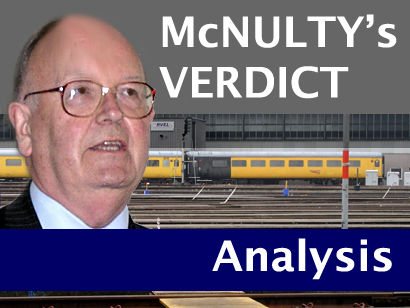SIR ROY McNULTY'S recommendation that trains in Britain should be worked by one person as a 'default' in future have been met with an angry response from the RMT union.
The proposal is one of a number of key reforms published as part of Sir Roy's objective to achieve a 30 per cent cut in railway costs by 2019.
His 'value for money' report published yesterday maintains that driver-only operation, usually known as DOO, is 'a safe method of operation and improves performance', and adds that DOO should be the 'default position ... with a second member of traincrew only being provided where there is a commercial, technical or other imperative'.
Many commuter routes around Britain, including some in the London area, have been worked by driver-only trains for many years, but the RMT has maintained steady opposition to any extension of the practice. Its stance led to a protracted dispute on ScotRail last year, where the union opposed the use of DOO trains on the newly-restored Airdrie-Bathgate line, which opened in December.
In the end, the RMT gave way to some extent, but trains on the line still carry a second member of crew as a ticket examiner, rather than a conductor. One key difference is that conductors control the doors and are in charge of the train; another is that ticket examination staff are paid less.
Sir Roy said a substantial reduction in costs is essential, and warned that if such a reduction could not be achieved, the alternative could be a 'smaller railway', although line closures have been ruled out at this stage.
Abolishing conductors on all local, regional and commuter trains would involve the loss of several thousand jobs, and the proposal raises questions about revenue protection on lines with unstaffed stations.
An RMT spokesman told Railnews that any proposed extensions of DOO would be fought by the union on grounds of safety and efficiency.
The union's general secretary Bob Crow added: "Rail services are 30% more expensive in the UK as against comparable European operations for one, simple reason – privatisation. It’s the greed, exploitation and restrictive practices of the train operators that have led us to this situation and we will fight any attempt to shift the blame on to hardworking staff trying to provide quality services against a backdrop of increasing demand and front-line cuts."


